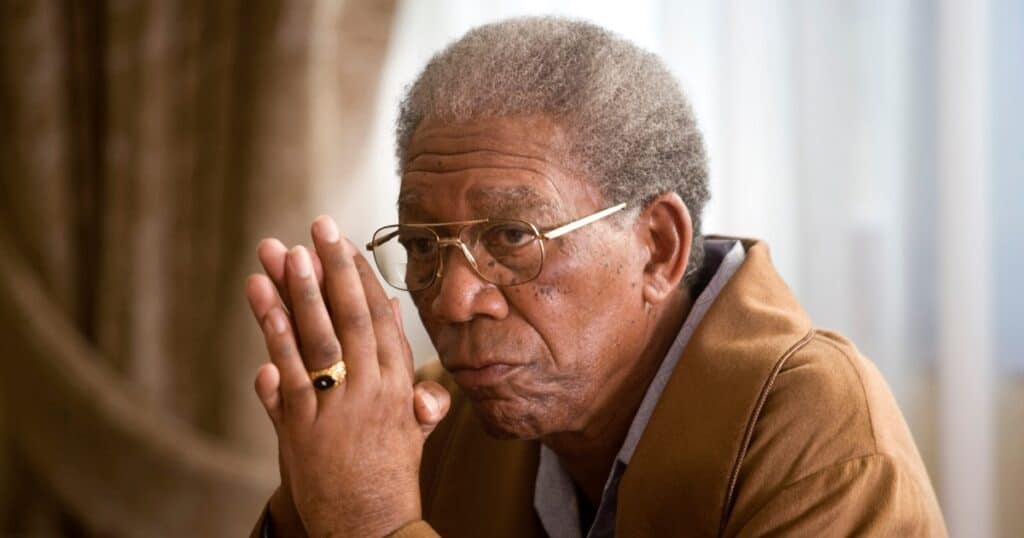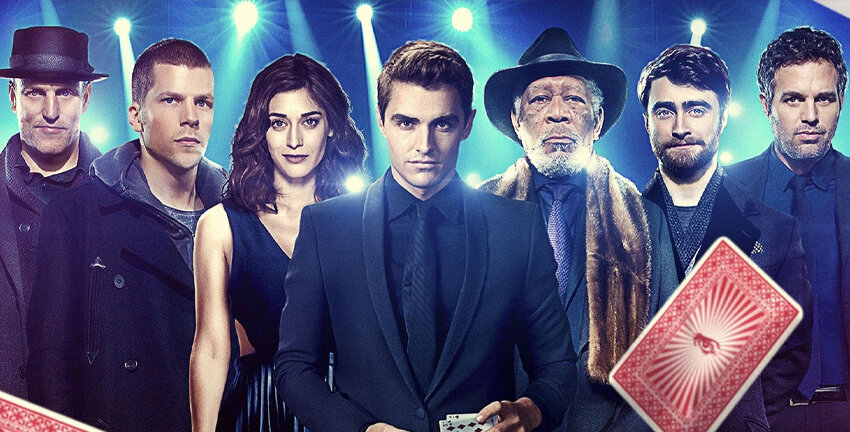Last Updated on March 5, 2024
Many people often blasphemously (and hilariously) joke around that Morgan Freeman is God. Not only because of his pitch-perfect casting as God but also due to his smooth, defining and, yes, god-like Morgan Freeman voice that one can’t picture penguins or parts of nature or, yes, God, without hearing the man. One reason could be that we’ve only ever really known Morgan Freeman as an older actor, not striking a chord with mainstream audiences until he was in his 50s.
Sure enough, his skills, screen presence, and voice had Hollywood calling every time they needed a kind, wise grandfather type or a grizzled vet from either side of the law or any narrator for any film. That persona has marked him as a welcome figure throughout modern cinema – despite the nearly constant cash grabs that pad out the unfortunate bulk of his filmography. There were some significant controversies surrounding this man for sure. Still, he has been given a bit of a pass… the public seems to have quickly forgiven the man who became the widely accepted ultimate Hollywood earthly depiction of God.
But to truly understand what happened to Morgan Freeman, we go back to the beginning, when he was born on June 1st, 1937, in Memphis, Tennessee. After serving in the US Air Force and a successful off-and-on Broadway career, Freeman joined the children’s show The Electric Company in 1971, playing characters like Easy Reader, DJ Mel Mounds and Count Dracula. After leaving – and some minor, sometimes uncredited roles on the big screen and in TV movies – Freeman landed his debut movie, playing a prisoner in Brubaker (1980), which would lead to his breakout: 1987’s Street Smart, playing a pimp to his first Oscar nomination and being declared by famed critic Pauline Kael was one of the best actors working.
After turning up as a drug counsellor in 1988’s Clean and Sober, Freeman became a true household name through a trio of movies that closed out his decade: a Civil War sergeant major who climbs through the ranks and stakes his position in Glory, a car driver person – a character he played on stage – in Driving Miss Daisy (to an Oscar nod and Golden Globe win) and real-life principal Joe Louis Clark in Lean On Me. Morgan Freeman was a household name…at 52. But he would be playing retired characters – that is, old people roles – just a few years later, namely 1992’s Unforgiven. Blooming late may have benefited Freeman. To most, there is no young Morgan Freeman. There is only one image of him, and so only one sound and all of it embodies a trusted and soothing figure, a sort of grandfatherly persona—no wonder he would be named one of the most trustworthy celebrities.

Here is a man who came on the scene as deep, calm and confident, just like his voice. As the decade turned, he voiced Frederick Douglass in The Civil War (1990), introducing what would become his trademark role: that of narrator. Whether guiding us through the cosmos or through global conflicts or through penguins’ journeys through the Antarctic or through traffic (he leant his voice to the Waze app), Freeman was the most reliable voice in all of the documentary medium. Spielberg recognized this earlier on with War of the Worlds (2005) in what retrospectively feels like a spoof of his voicework. The guy was even trusted with voicing Neil f*cking Armstrong! And there’s a reason, as scientific studies found that he has a “positive association” with culture. He had become omnipresent. Indeed, the guy played God and no one took issue with it. As far as that goes, he once said, “I said at the start, I think we invented God. So if I believe in God, and I do, it’s because I think I’m God.” So there! He would take on the role of God in 2003’s Bruce Almighty and its 2007 sequel Evan Almighty.
From there, Morgan Freeman started adhering to the following: “Aa good story and an interesting character is all I am looking for.” With that, he hit the ‘90s with flops (1990’s The Bonfire of the Vanities) and clear favorites (Azeem in 1991’s Robin Hood: Prince of Thieves). In 1994, he had one of his most celebrated roles in The Shawshank Redemption, which earned hi yet another Oscar nod. As the lifer Red (also the narrator, his first doing so in a feature narrative), he was the soul of the film, the guide who taught audiences what hope really meant. More mainstream fare like Outbreak and Se7en (both 1995), followed. Both were hits, with Se7en becoming iconic. In 1996, he co-starred in two now-obscure flops, Chain Reaction and Moll Flanders. In 1997, Freeman took diverse roles in Amistad (some of Freeman’s ancestors were actually slaves) and Kiss the Girls as Alex Cross, later reprising the character for 2001’s Along Came a Spider.
By the end of the decade and beginning of the 21st century, it was like you couldn’t enter a theater without seeing – and hearing – Morgan Freeman. In 1999, he starred in two disaster movies – Deep impact (fittingly playing the President) and Hard Rain, while he tried comedy with 2000’s Nurse Betty. Plus, he was in the Tom Clancy action flick The Sum of All Fears (2002), the legal thriller High Crimes (2002), the Stephen King adaptation Dreamcatcher (2003), the drama Levity (2003), and paycheck casher The Big Bounce (2004).
That same year, Morgan Freeman co-starred in the film that would finally win him his first Academy Award, playing a former boxer and, yes, giver of sage advice, in Million Dollar Baby (2004). He was greeted with a standing ovation, earned not just for the performance but his reputation in the industry. But Freeman would fall into what so many do, although they’re usually much younger: the post-Oscar slump. There have been worthwhile turns, like Lucius Fox in Christopher Nolan’s BATMAN trilogy, and people dug Red (2010) and he would land one more Oscar nomination for Invictus (2009), playing Nelson Mandela in a rare turn as a real-life figure (he, forgettably to many, played Malcolm X in a 1981 TV movie). But those movies, and even legitimately memorable works like Gone Baby Gone (2007) were few and far between at that point.
For somebody who couldn’t afford it early in his late-blossoming career, Morgan Freeman was signing on for a lot of padding, with a lot of actioners and thrillers. His filmography became cluttered with throwaways and only a handful of titles you could name. Remember 2005’s Unleashed or Edison or the next year’s The Contract? Probably not. How about Lucky Number Slevin and 10 Items or Less (2006)? Or Thick as Thieves (2009), Oblivion (2013) and Last Knights (2015)? Certainly not over Wanted (2008), Now You See Me (2012) and the Has Fallen flicks (2013, 2016, 2019). And then there’s The Lego Movie, Transcendence, Lucy and 5 Flights Up, all from the same year (2014) – a sure sign someone is doing it for the check. He also had minor roles in movies like Momentum (2015), Ted 2 (2015), and then bigger parts in the comedies Going in Style and Just Getting Started (both 2017), along with the VOD-aimed thriller The Poison Rose (2019), which holds a whopping 0% on Rotten Tomatoes. And what purpose did it have for him to narrate The Love Guru (2008), Conan the Barbarian (2011) and Alpha (2017)?

Freeman, too, would appear in plenty of movies that were either lightwork or excuses to work with other folks he admired: 2007’s The Bucket List with Jack, 2009’s The Maiden Heist, family movie Dolphin Tale (2011) and its sequel (2014), the Rob Reiner dud The Magic of Belle Isle (2012), and the movie that felt like could have just been a culmination of his career, the septuagenarian-heavy Last Vegas (2013). Really, at this point, we’re just listing movies.
However, despite a lot of subpar roles, he was still, after all, a legend in the field, becoming a Kennedy Center honoree (2008) and being given the lifetime achievement awards from both the AFI (2011) and SAG (2017). Things took a turn in 2018, when eight women came forward alleging sexual harassment and misconduct, going back to at least 2012’s Now You See Me. In a token attempt to cover it, Freeman issued a statement that bore no responsibility: “I am not someone who would intentionally offend or knowingly make anyone feel uneasy. I apologize to anyone who felt uncomfortable or disrespected — that was never my intent.” More controversial sexual matters would be brought up in 2015 following the murder of his step-granddaughter, E’Dena Hines, who he allegedly sexually abused – there were even rumors of the two planning to marry. Hines’ death would be later tied to Freeman by the killer’s family, saying the actor was indirectly to blame for the scandal.
And yet he prevailed through all of it. He just has those grandfather qualities to audiences, so much so that the allegations didn’t really phase him like it had so many before him. Admittedly, you’d be hard-pressed to come up with a genuinely great movie he has done since, but he keeps plugging away. Recently, his career seems to be on the upswing, with A Good Person (2023) (which he’s actually great in), and the Taylor Sheridan TV series Special Ops: Lioness… At 86, Freeman seems to be in no rush to retire, and to that we say – good!
What’s your favorite Morgan Freeman movie? Let us know in the comments!




















Follow the JOBLO MOVIE NETWORK
Follow us on YOUTUBE
Follow ARROW IN THE HEAD
Follow AITH on YOUTUBE